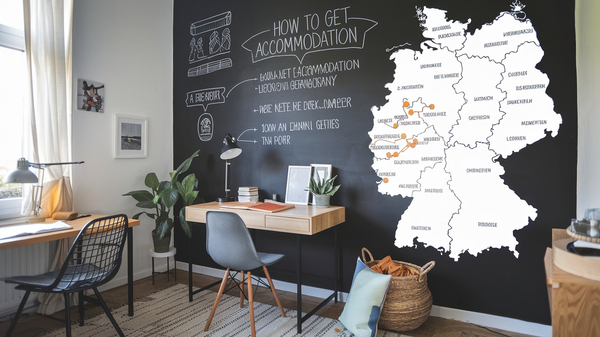Finding accommodation in Germany as a student can be a significant part of your study abroad journey. Germany offers various housing options for international students, but securing a place can be challenging, especially in larger cities. This guide will help you navigate the process and ensure you find the right accommodation to fit your needs.
Types of Accommodation
Germany provides several options for student housing, and it's essential to choose one that suits your preferences and budget. Here are the most common types:
-
Student Dormitories (Studentenwohnheim): Managed by student unions (Studentenwerk), these dorms are the most affordable option. Dorms typically offer shared rooms or apartments, which allow students to interact with others, enhancing the social experience. However, spaces are limited, and waiting lists can be long, so it's advisable to apply early.
-
Private Accommodation: If you're looking for more privacy or missed out on a dorm spot, private flats or shared apartments (WG - Wohngemeinschaft) are popular alternatives. Shared flats can reduce costs and provide a similar social environment as dorms. Websites like WG-Gesucht are helpful for finding such listings.
-
Hostels and Short-Term Housing: If you're arriving in Germany without securing long-term accommodation, hostels or short-term rentals can serve as temporary solutions while you search for a more permanent option.
Tips for Finding Accommodation
1. Start Early
Competition for student housing can be intense, especially in cities like Berlin, Munich, and Frankfurt. As soon as you receive your university acceptance letter, begin your search. Applying early for dorms and monitoring private listings will give you a better chance of securing a place.
2. Use Trusted Platforms
When searching for private housing, use reliable websites such as WG-Gesucht, HousingAnywhere, or even the university's housing portal. Be cautious of scams and always verify the legitimacy of listings.
3. Get Help from Education Consultants
If you're struggling to navigate the housing market, consulting with experts can make the process easier.
German Study Abroad Consultants can provide valuable insights into housing options in different cities. Their knowledge of the local market can be especially beneficial for first-time international students.
Costs of Accommodation
The cost of student housing varies depending on the city. On average, student dormitories cost between €200-400 per month, while private housing can range from €300-800, depending on the location and type of accommodation. In cities like Munich and Frankfurt, expect to pay on the higher end of the scale. Be sure to budget for utilities and internet, which may or may not be included in the rent.
Signing a Rental Contract
Once you’ve found accommodation, signing a rental contract is the next step. The contract will detail your rights and responsibilities as a tenant, including rent, deposit (Kaution), and termination notice periods. It's essential to read the contract carefully before signing and seek advice if necessary.
Some
Overseas Education Consultants can assist with understanding rental agreements and ensuring you're aware of your tenant rights in Germany. This can prevent future misunderstandings and help you feel more secure in your housing arrangement.
Alternatives: Student Exchange Programs and University Partnerships
Some universities in Germany have exchange programs or partnerships with other institutions, which often include pre-arranged housing. If you're part of such a program, check with your university about housing options. These programs can provide a hassle-free way to secure accommodation, as universities often reserve dorm spots for exchange students.
For those seeking personalized guidance,
German Education Consultants can offer advice tailored to your specific situation. They can help connect you with local housing resources, ensuring that you find a suitable place to live during your studies.
Final Thoughts
Securing accommodation in Germany is one of the most important aspects of your study abroad experience. By starting your search early, using trusted platforms, and seeking expert advice when needed, you'll increase your chances of finding a comfortable and affordable place to live. Remember, a well-chosen accommodation can significantly impact your overall experience as an international student in Germany.
Planning ahead and utilizing resources like German Education Consultants and Study Abroad Consultants will ensure a smooth transition into student life in Germany




